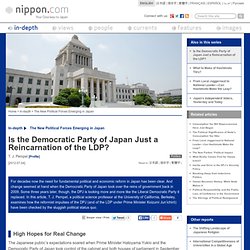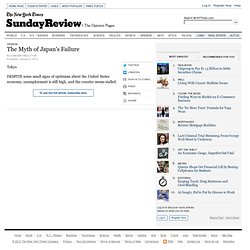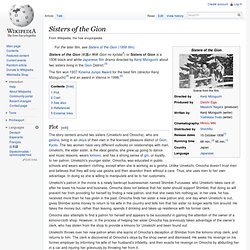

Is the Democratic Party of Japan Just a Reincarnation of the LDP? High Hopes for Real Change The Japanese public’s expectations soared when Prime Minister Hatoyama Yukio and the Democratic Party of Japan took control of the cabinet and both houses of parliament in September 2009.

Under the preceding 20 years of almost uninterrupted Liberal Democratic Party control, Japan’s economy shriveled from 18% of world GDP to 8%, wiping out virtually all of the advances the country had made since the 1960s. In the process, Japan also surrendered its primacy at the head of East Asia’s overall economic success to a China growing at 10% a year, which was Japan’s own growth rate during the 1960–70 period. Nor had the LDP dealt effectively with the country’s exploding demographic problems, its rising public sector debt, or its escalating levels of unemployment and inequality.
Japan’s “lost decade” had stretched into 20 years of social malaise, administrative dysfunction, and political abdication. A Rocky Start for DPJ Rule. The Myth of Japan’s Failure. DESPITE some small signs of optimism about the United States economy, unemployment is still high, and the country seems stalled.

Time and again, Americans are told to look to as a warning of what the country might become if the right path is not followed, although there is intense disagreement about what that path might be. Here, for instance, is how the CNN analyst David Gergen has described Japan: “It’s now a very demoralized country and it has really been set back.” But that presentation of Japan is a myth. By many measures, the Japanese economy has done very well during the so-called lost decades, which started with a stock market crash in January 1990. The Japan Story. Eamonn Fingleton started a debate on Japan's slump or lack thereof with a Sunday review piece in the NYT.

This has since been joined by Paul Krugman and others. Since I have been asked by a number of people what I thought, I will weigh in with my own two cents. First I agree with Fingleton that the description of Japan as a basket case is way off the mark. While GDP growth has been weak, its productivity growth has been better than the average in the OECD. Source: OECD. Sisters of the Gion. Sisters of the Gion (祇園の姉妹, Gion no kyōdai?)

Or Sisters of Gion is a 1936 black and white Japanese film drama directed by Kenji Mizoguchi about two sisters living in the Gion District.[3] The film won 1937 Kinema Junpo Award for the best film (director Kenji Mizoguchi)[4] and an award in Vienna in 1998.[2] Plot[edit] Umekichi’s patron in the movie is a newly bankrupt businessman named Shimbei Furusawa, who Umekichi takes care of after he loses his house and business. Omocha does not believe that her sister should support Shimbei, that doing so will prevent her from providing for herself by finding a new patron, and that she owes him nothing as, in her view, he has received more than he has given in the past. Omocha also attempts to find a patron for herself and appears to be successful in gaining the attention of the owner of a kimono/cloth shop. Umekichi throws over her new patron when she learns of Omocha's deception of Shimbei from the kimono shop clerk, and returns to him. Cast[edit] Sisters of the Gion (1936.
"We are Americans": Japanese Responses to Internment, 1942. JF Ptak Science Books Post 1681 “....there must be a point beyond which there may be no abridgement of civil liberties and we feel that whatever the emergency, that persons must be judged, so long as we have a Bill of Rights, because of what they do as persons.

We feel that treating persons, because they are members of a race, constitutes illegal discrimination, which is forbidden by the fourteenth amendment whether we are at war or peace.”-- A. L. Wirin, Counsel for the Southern California Branch of the American Civil Liberties Union, speaking on the internment of Japanese-Americans, 1942. The Orientation of Science and Technology: A Japanese View. Overcome by Modernity: History, Culture, and Community in Interwar Japan. In the decades between the two World Wars, Japan made a dramatic entry into the modern age, expanding its capital industries and urbanizing so quickly as to rival many long-standing Western industrial societies.

The Japan Research Centre (JRC) at SOAS. Welcome to the Japan Research Centre The Japan Research Centre (JRC) has been the forum for Japan -related research activities at SOAS since 1978.

The JRC develops and coordinates academic research and teaching, drawing upon the expertise of the Japan specialists who are based in various departments throughout the School. Constitution for the Japan Research Centre Forthcoming Events SOAS Studies in Modern and Contemporary Japan Published by Bloomsbury, the series features scholarly books on Japan, showcasing new research monographs as well as translations of scholarship not previously available in English. Bloomsbury News Announcements My term as Chair of the JRC is about to come to an end. Dr Steve Dodd Academic Staff JRC Steering Committee JRC Academic Staff Publications Stephen Dodd. Memories of Hiroshima and Nagasaki - The Asahi Shimbun.